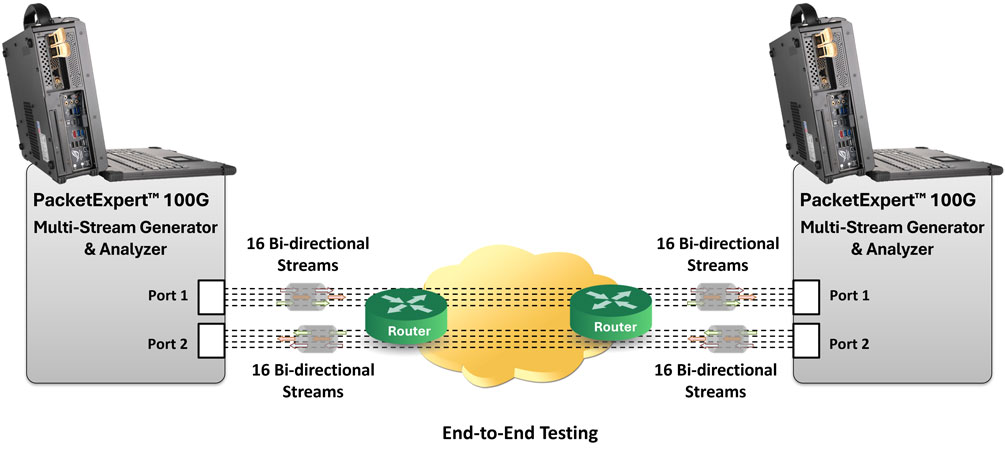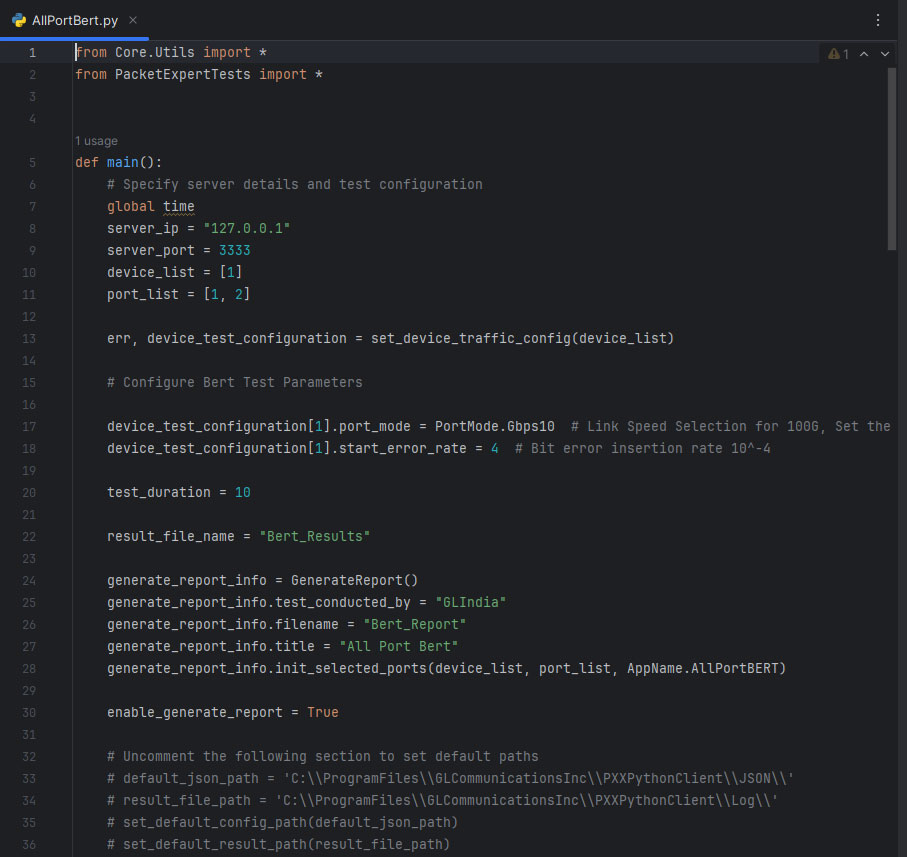Next-Generation Network Testing Solution up to 100 Gbps
Welcome to the latest issue of GL's Newsletter, offering insight into our advanced Ethernet and IP testing solution, PacketExpert™ 100G. This tool tests high-speed networks at wirespeed, making it perfect for network engineers in search of precision and adaptability. With the ability to seamlessly interface to industry-standard equipment, PacketExpert™ 100G ensures smooth incorporation into your existing testing environments.

Overview
GL’s PacketExpert™ 100G is a hardware platform with a web-based user interface designed for wirespeed Ethernet and IP testing at speeds of up to 100 Gbps. The PacketExpert™ 100G functions as a full-fledged PC, equipped with specialized network interface cards, GL’s proprietary PacketExpert™ software, optimized RAM, storage, processing, and cooling systems. The Ethernet ports support speeds of 1 Gbps, 10 Gbps, 25 Gbps, 40 Gbps, 50 Gbps, and 100 Gbps (with 2.5 Gbps and 5 Gbps support coming soon). The appliance comes with up to eight ports, all of which can generate and receive traffic simultaneously.
User-Friendly Interface for Enhanced Testing
Available in portable and rack-mount configurations, the PacketExpert™ 100G can accommodate up to eight ports in a single appliance. Its user-friendly web-based user interface supports multi-user and multi-location access, allowing users to configure test parameters, start and stop tests, view real-time graphs, and export results to PDF and CSV formats. Furthermore, users can run Python scripts to automate complex testing scenarios.
Enhanced Flexibility with Multiple Speed Support
The PacketExpert™ 100G hardware platform features high-speed 100 Gbps QSFP ports. These versatile QSFP ports support optical connections at 1 Gbps, 10 Gbps, 25 Gbps, 40 Gbps, 50 Gbps, and 100 Gbps by utilizing adapters with the respective SFP modules. Furthermore, GL provides a comprehensive accessory kit complete with QSFPs, fiber optic cables, and adapters.
Comprehensive Forward Error Correction (FEC) Support
PacketExpert™ 100G offers comprehensive support for FEC (as required by IEEE 802.3), a critical feature for ensuring data integrity in high-speed networks, especially in long-distance transmissions. FEC works by detecting and correcting bit errors that may occur during data transmission, which helps improve overall network reliability and performance. Supported FEC types are:
- Fire Code FEC
- RS-FEC (528, 514)
- RS-FEC (544, 514)
By adding extra information to detect and fix errors, FEC significantly enhances the dependability of data communication, reducing the likelihood of data loss or corruption.
Comprehensive Testing Capabilities
The PacketExpert™ 100G can perform Bit Error Rate Testing (BERT), Smart Loopback Testing, RFC 2544 Testing (throughput, packet loss, back-to-back, and latency measurements), ITU-T Y.1564 for verifying service level agreements, and Multi-Stream Traffic Generator and Analyzer (MTGA). Each 100 Gbps port allows for independent Ethernet, VLAN, MPLS, IP, and UDP layer-wise testing at wirespeed. BERT, RFC 2544, and Loopback applications are implemented across all transport layers, including Layer 2 (Ethernet), Layer 2.5 (VLAN/MPLS), Layer 3 (IPv4/IPv6), and Layer 4 (UDP).
Efficient Multi-Stream Traffic Testing
The Multi-Stream Traffic Generator and Analyzer allows the device to generate multiple streams of Ethernet traffic with customizable protocol headers, packet sizes, and payloads. Supporting up to 16 streams per port, it is ideal for end-to-end testing of Wide Area Networks at speeds up to 100 Gbps. Key metrics measured include throughput, packet loss, delay, jitter and more.

Streamlining Multiservice Testing
ITU-T Y.1564 is a carrier Ethernet Service Activation test methodology that enables full validation of Ethernet Service-Level Agreements (SLAs) in a single test. GL’s ExpertSAM™ is designed for multiservice applications to measure the maximum performance of devices or networks. Each port can handle up to 16 streams, enabling the device to manage 32 services under full load conditions. It assesses Ethernet services ability to handle voice, data, and video traffic, overcoming the limitations of traditional RFC 2544 testing, particularly in Wide Area Network testing.

Python Automation and Regression Testing
PacketExpert™ 100G supports Python automation, which allows for seamless integration into automated testing environments. Through the PacketExpert™ Python client APIs, users can control all functionalities of the device remotely, making it ideal for regression testing in network validation setups.

Python Sample Script
Key Features
- PCIe based hardware supports up to 8 x 100G ports in either portable or rack-mount form factors
- Provides 1 Gbps, 10 Gbps, 25 Gbps, 40 Gbps, 50 Gbps, and 100 Gbps (2.5 Gbps and 5 Gbps coming soon) speeds on the same ports with suitable adapters and breakout cables
- Supports QSFP28 form factor
- Supports Fire Code FEC, RS-FEC (528, 514) and RS-FEC (544, 514) FECs to work with a variety of interfaces
- Provides 1 Gbps, 10 Gbps, 25 Gbps, 40 Gbps, 50 Gbps, and 100 Gbps rates with FEC as required by IEEE 802.3
- Detects Layer 1 alarms and errors
- Simultaneously generate and receive Ethernet traffic at 100% wirespeed (bidirectional 100 Gbps rate)
- Generates traffic from Layer 2 to Layer 4 at up to 100 Gbps with varying protocol headers and packet sizes
- Generate frames with lengths ranging from 64 bytes to Jumbo frames (up to 16000 bytes)
- BERT supports industry standard PRBS patterns including 29-1, 211-1, 215-1, 220-1, 223-1, 229-1, and 231-1, as well as user defined patterns
- BERT can be tested at Ethernet (Layer 2), up to 3 Stacked VLAN (Q-in-Q), up to 3 Stacked MPLS (Layer 2.5), IP (Layer 3) and UDP (Layer 4)
- Capable of handling full wirespeed BERT, in both directions Electrical/Optical ports
- Real-time graphical representation of the combined Throughput, Bit Error rate, and Sync loss count can be plotted over time for BERT testing
- Supports smart loopback with auto layer detection, and allows swapping source and destination addresses at MAC, IP and UDP layers
- RFC 2544 can be tested on Ethernet, VLAN, MPLS, IPv4/IPv6, and UDP layers. Supports Throughput, Latency, Frame Loss, and Back-to-Back performance tests
- Displays graphs and statistics for all the RFC 2544 tests
- Comprehensive validation of Ethernet SLAs in a single test
- Generates traffic at throughput of CIR (guaranteed traffic), EIR (best effort bandwidth) and Traffic Policing Rates (dropped bandwidth) ensuring key performance indicators validation
- Supports multiple streams with customizable configurations, including MAC/VLAN/IP/UDP headers, rate, and frame size, allowing prioritization of different traffic types (e.g., voice, video, data)
- Measures packet loss, delay, and jitter for each stream, providing real-time graphs to visualize these metrics across all streams
- Test automation and regression testing via Python and REST APIs
- Generate reports in PDF and CSV formats that include graphs
 Back to Newsletter Index Page
Back to Newsletter Index Page